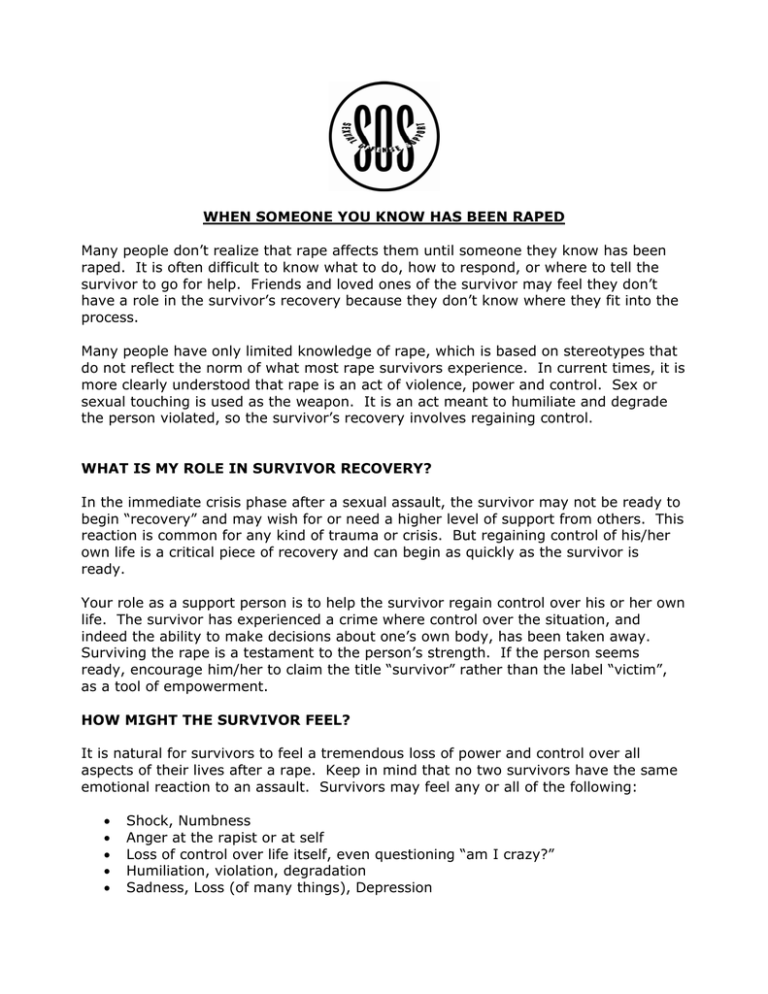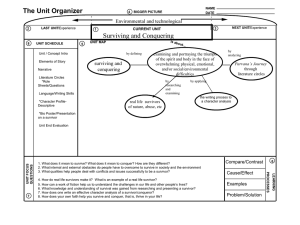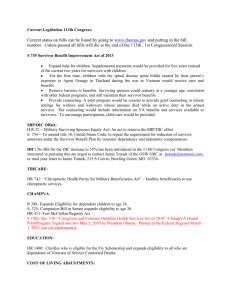Document 10452935
advertisement

WHEN SOMEONE YOU KNOW HAS BEEN RAPED Many people don’t realize that rape affects them until someone they know has been raped. It is often difficult to know what to do, how to respond, or where to tell the survivor to go for help. Friends and loved ones of the survivor may feel they don’t have a role in the survivor’s recovery because they don’t know where they fit into the process. Many people have only limited knowledge of rape, which is based on stereotypes that do not reflect the norm of what most rape survivors experience. In current times, it is more clearly understood that rape is an act of violence, power and control. Sex or sexual touching is used as the weapon. It is an act meant to humiliate and degrade the person violated, so the survivor’s recovery involves regaining control. WHAT IS MY ROLE IN SURVIVOR RECOVERY? In the immediate crisis phase after a sexual assault, the survivor may not be ready to begin “recovery” and may wish for or need a higher level of support from others. This reaction is common for any kind of trauma or crisis. But regaining control of his/her own life is a critical piece of recovery and can begin as quickly as the survivor is ready. Your role as a support person is to help the survivor regain control over his or her own life. The survivor has experienced a crime where control over the situation, and indeed the ability to make decisions about one’s own body, has been taken away. Surviving the rape is a testament to the person’s strength. If the person seems ready, encourage him/her to claim the title “survivor” rather than the label “victim”, as a tool of empowerment. HOW MIGHT THE SURVIVOR FEEL? It is natural for survivors to feel a tremendous loss of power and control over all aspects of their lives after a rape. Keep in mind that no two survivors have the same emotional reaction to an assault. Survivors may feel any or all of the following: • • • • • Shock, Numbness Anger at the rapist or at self Loss of control over life itself, even questioning “am I crazy?” Humiliation, violation, degradation Sadness, Loss (of many things), Depression • • • • • • • Fear of retribution if s/he tells anyone Fear for safety, Anxiety, Nightmares Guilt, Shame, Self-Blaming (for any choices s/he made which, if done differently, may have altered the course of events) Fear of being blamed by others Confusion Losing trust and faith in the goodness of others, feeling unsafe in the world Questioning his/her own judgement HOW MIGHT THE SURVIVOR BEHAVE? Expressive: crying, yelling, shaking, raging, even laughing. Many people chuckle or laugh when they are in a tense or uncomfortable situation. Survivors who seek assistance have to tell a very personal and graphic story about what happened – often to people they don’t know – and this can be painful and uncomfortable. Appearing extremely controlled: calm, pulled together, emotionless, numb, able to easily assimilate the rape experience into everyday life; or appearing fine because they are ignoring it completely, not wanting to talk about it at all (even though they aren’t ok on the inside). Appearing withdrawn: avoiding classes, not going to meals, not leaving their room, not engaging with friends, not engaging in normal activities. Using unhealthy coping mechanisms: exercising too much, developing an eating disorder, taking out anger on others and inappropriately. Symptoms arising later: easily startled, afraid to be alone, difficulty sleeping, disruptions in eating, nightmares, flashbacks, panic attacks, repeated remembering. If symptoms persist, counseling may be needed to overcome them. WHAT CAN I DO TO HELP? Let the survivor talk about the rape experience and how it feels to be victimized. Believe the survivor. Don’t spend any time questioning details or trying to figure out what actually happened. This is important! Don’t try to take control of the survivor’s reactions, whatever they may be. During the assault, the survivor was robbed of all sense of control over his/her own body and choice. Making decisions on their own, no matter how minor, will help the survivor begin to regain a sense of empowerment and self-determination. ESPECIALLY let the survivor decide whether or not to report to police, go to the hospital or the Student Health Service, to prosecute or not, to change residence, or seek counseling. You may want to encourage medical attention for treatment of possible sexually transmitted diseases, pregnancy, or injuries inflicted during the assault, as well as crisis services or counseling services to learn about victims’ options or for assistance in the recovery process. But always allow the survivor to make the decisions. Avoid saying “it’s ok”. You may want to try to instill hope that things will get better for the person by focusing on the strength they have demonstrated or how they have overcome other obstacles in life. But it really isn’t “ok” right now for the survivor, so if you say that, it may minimize their experience or make them think that you don’t see their experience as serious or a valid problem. Don’t ignore your own feelings. You may need to talk to someone. But while with the survivor, avoid allowing your own emotions to take priority over the survivor’s. Accept the survivor’s reactions, whatever they may be. Communicate that their feelings are normal. The survivor is having a NORMAL reaction to an abnormal event. Remind the survivor that healing takes time. Focusing only on sexual aspects of the assault or choices the survivor made (ex: to drink or wear sexy clothing) may feel judgmental and further traumatize the survivor, and it is unnecessary. Remember that sexual assault is an act of violence. Don’t blame the survivor for what happened. Honor whatever the survivor did to survive. Give the survivor time to feel comfortable in discussing the incident. Don’t push. Respect the survivor’s need for confidentiality and never share what s/he has told you with others, unless you have the survivor’s permission. If you feel inclined to tell someone else, ask the survivor if that’s ok first and honor their answer. Keep in mind that you might feel overwhelmed. Don’t hesitate to seek outside support for yourself. If you are a UD student, you can call SOS (which is confidential and anonymous) or utilize the Center for Counseling and Student Development, which is confidential. There are many off-campus resources as well. If you are a parent, you may want to contact the local crisis agency in your area for referral or services. Understand that it may take weeks, months, even years for the survivor to integrate what happened into his/her life experience and further the recovery process. You may want to suggest the survivor seek counseling or join a support group. WHAT MIGHT I FEEL? • • • • • • • • pain, sorrow, sadness that this happened to your loved one disgust, self-blame (thinking you could have done something to protect the survivor) sympathy, or empathy, for the survivor anger at the rapist(s), a desire for revenge preoccupation with sexual aspects of the rape, or the role of alcohol in the incident, wishing the victim had acted differently worry or anxiety that this will happen again, protectiveness toward the survivor impatience with the survivor’s recovery process, wishing she could get over it vulnerable because you may be reminded of your own past victimization experience(s) and you may re-experience pain or past symptoms WHAT CAN I DO? • • • • • • • • Talk to someone you trust about how you are feeling. This may be a crisis for you as well and it is important that you respond to your emotional needs. Use healthy coping mechanisms that you have used in dealing with other crises. If strong feelings persist, you may want to talk to a counselor or attend some form of support group for friends & loved ones of survivors. If you have been a survivor of sexual violence, this may activate some of your own feelings of victimization and you may want to revisit your healing process. It is important to stop, listen and attend to your feelings. Volunteer in an agency that works to stop sexual assault and other forms of violence against women in your community or on campus. (On campus: Men Against Rape & Sexism – MARS, Students Acting for Gender Equity – SAGE, VDay UD, or Sexual Offense Support – S.O.S.). Educate yourself about sexual assault by attending relevant events – Sexual Assault Awareness Month programming, an S.O.S. or other related program in your building, read books, watch movies, take a Women’s Studies class. Confront sexism, heterosexism, and other forms of oppression. Confront sexist language and jokes about rape. Help to challenge and change others’ attitudes that allow the rape culture we live in to thrive. Try to put aside your focus on sex, alcohol or the victim’s choices and respond with compassion rather than judgment. Ultimately, rape is about power & control and no victim “asks” to be raped even if they choose to get drunk. CAMPUS RESOURCES: Sexual Offense Support (S.O.S.) -- 24 hr/7 days a week hotline: 831-2226 On the web: http://www.udel.edu/sos Service is for survivors and their friends/family/significant other/roommates, etc. Offers victim advocacy & crisis intervention including: information & referral, crisis intervention & support, accompaniment to hospital, judicial, counseling, or police. In addition, the S.O.S. Coordinator provides crisis counseling at Wellspring, Sexual Assault Survivor Support Group, applying for financial victim assistance, advocacy throughout the on-campus student conduct process, and assistance with communicating with professors, Residence Life staff, or off-campus landlords regarding release from contract. To utilize these services, make an appointment at Wellspring, 831-3457. Office of Equity & Inclusion – Provides information and advocacy for students who have experienced sexual harassment. 831-8063 http://www.udel.edu/oei Rape Aggression Defense Class (for women only): call 831-2222 for info or go to: http://www.udel.edu/PublicSafety/polserv_whatisrad.html LOCAL RESOURCE: ContactLifeline – 24 hr/7 days a week crisis hotline (including suicide and rape crisis): 1-800-262-9800. On the web: http://www.contactlifeline.org/





